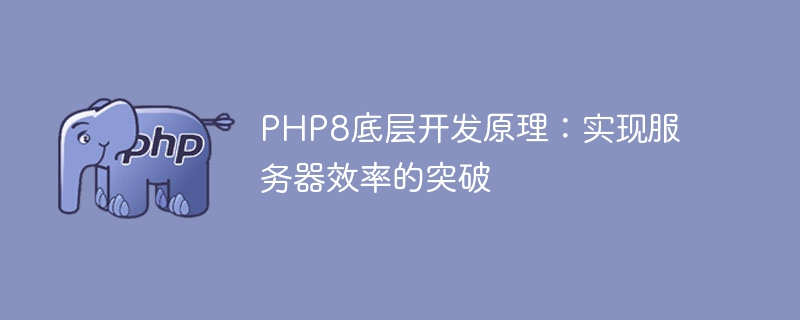

The underlying development principle of PHP8: achieving a breakthrough in server efficiency
Writing efficient server-side code is an important challenge for developers. With the release of PHP8, this version brings some important underlying development principles aimed at improving the execution efficiency of PHP code on the server. This article will introduce some underlying development principles in PHP8 and provide some code examples to show how to achieve breakthroughs in server efficiency.
1. Just-in-Time Compiler (JIT)
The Just-in-Time (just-in-time) compiler was introduced in PHP8, which is an important optimization feature. Through JIT, PHP code can be compiled at runtime, converting source code into machine code to increase the execution speed of the code. In the past, PHP code needed to be parsed and executed line by line through the interpreter, which was inefficient. Through JIT, the execution speed of PHP code can be greatly improved.
The following is a simple code example showing how to use the JIT compiler.
<?php
function fibonacci($n) {
if ($n <= 1) {
return $n;
}
return fibonacci($n - 1) + fibonacci($n - 2);
}
/* 启用JIT编译器 */
opcache_compile_file('fibonacci.php');
$start = microtime(true);
$fibonacci_10 = fibonacci(10);
$end = microtime(true);
$time = $end - $start;
echo "Fibonacci(10) 的结果为:" . $fibonacci_10 . ",耗时:" . $time . "秒";
?>In the above code, we define a function fibonacci() to find the Fibonacci sequence. In the main program, we enable the JIT compiler and calculate the value of the 10th number in the Fibonacci sequence. We can see the effect of the JIT compiler by examining the time required for execution. With the JIT compiler enabled, PHP code executes faster and more efficiently than without the JIT compiler.
2. Zippy extension
The Zippy extension was introduced in PHP8 to improve the compression and decompression efficiency of the code. Zippy is a powerful compression and decompression library that supports multiple compression formats and provides a simple and easy-to-use API. By using the Zippy extension, we can handle compressed files more efficiently in the server's code.
The following is a simple example using Zippy extension.
<?php
/* 创建一个压缩文件 */
$archive = new ZipArchive();
$archive->open('archive.zip', ZipArchive::CREATE | ZipArchive::OVERWRITE);
/* 添加文件到压缩文件中 */
$archive->addFile('file1.txt');
$archive->addFile('file2.txt');
$archive->addFile('file3.txt');
/* 关闭压缩文件 */
$archive->close();
/* 解压缩文件 */
$unzip_dir = 'unzip_dir';
$archive->extractTo($unzip_dir);
$archive->close();
echo "压缩文件创建成功,文件解压缩到目录:" . $unzip_dir;
?>In the above code, we used the ZipArchive class to create a compressed file named "archive.zip" and added three text files to it. Then, we use the extractTo() method to extract the file to the specified directory. By using the Zippy extension, we can process compressed files more efficiently and improve the execution efficiency of the server.
Conclusion
The underlying development principles introduced by PHP8 provide more options for writing server-side code, allowing developers to achieve breakthroughs in server efficiency. By using features such as the JIT compiler and Zippy extensions, developers can write more efficient code and improve server execution speed and performance.
This article introduces the JIT compiler and Zippy extension in PHP8 and provides corresponding code examples. I hope this information can help readers understand the underlying development principles in PHP8 and improve the efficiency of server-side code. Let's seize these new features together and write more efficient PHP code.
The above is the detailed content of PHP8 underlying development principles: achieving breakthroughs in server efficiency. For more information, please follow other related articles on the PHP Chinese website!